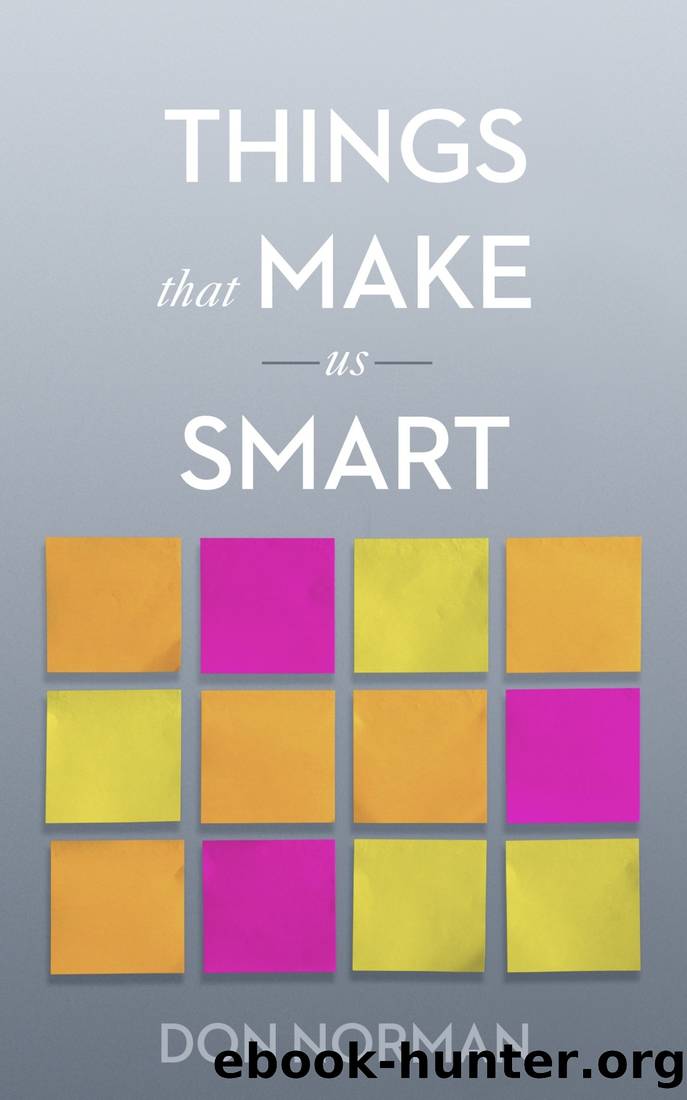Things That Make Us Smart by Don Norman

Author:Don Norman [Norman, Don]
Language: eng
Format: epub
ISBN: 9781626815377
Published: 2014-11-30T16:00:00+00:00
Disembodied Intelligence
The sciences of cognition have tended to examine a disembodied intelligence, a pure intelligence isolated from the world. It is time to question this approach, to provide a critique of pure reason, if you will. Humans operate within the physical world. We use the physical world and one another as sources of information, as reminders, and in general as extensions of our own knowledge and reasoning systems. People operate as a type of distributed intelligence, where much of our intelligent behavior results from the interaction of mental processes with the objects and constraints of the world and where much behavior takes place through a cooperative process with others.
In the research areas studied by experimental psychologists, linguists, and workers in the field of artificial intelligence, thought and understanding are assumed to take place with little or no hesitation, little or no error, and little or no doubt. Scientists make these assumptions in order to simplify their task. âAfter all,â they will state, âthe phenomena we are studying are so complex that it is essential to look at them first without all those other complicating factors. Then, after we have understood the isolated case, we can move on to the more realistic and complex situations.â The problem with this point of view is that the so-called simplification may be making the task more difficult.
With a disembodied intellect, isolated from the world, intelligent behavior requires a tremendous amount of knowledge, lots of deep planning and decision making, and efficient memory storage and retrieval. When the intellect is tightly coupled to the world, decision making and action can take place within the context established by the physical environment, where the structures can often act as a distributed intelligence, taking some of the memory and computational burden off the human. To give one example: Linguists are continually worried about the amount of ambiguity that exists within language. A huge amount of scientific research has gone into developing schemes for understanding and trying to minimize this ambiguity. But the ambiguity almost always results from the analysis of single, isolated sentences: in real situations, where several interacting people deal with real events, the sentences usually have only one meaningful interpretation. Actually, even when communications are ambiguous, they are usually not perceived as such by either speaker or listener, even though both may have different interpretations of the meaning. It is this lack of perception of ambiguity that is important, and it derives from the communicative, social nature of language, something that is entirely missed when the language is studied as isolated, âsimplifiedâ printed sentences or utterances, completely abstracted from the real, social setting.
Information in the world can be thought of as a kind of storehouse of data. This has many advantages. The world remembers things for us, just by being there. When we need a particular piece of information, we simply look around, and there it is. Do I need to repair my car? I donât have to remember the exact shape of the part, because when the time comes for me to do the task, the shape is there in front of me.
Download
This site does not store any files on its server. We only index and link to content provided by other sites. Please contact the content providers to delete copyright contents if any and email us, we'll remove relevant links or contents immediately.
Enlightenment Now: The Case for Reason, Science, Humanism, and Progress by Steven Pinker(7306)
A Journey Through Charms and Defence Against the Dark Arts (Harry Potter: A Journey Through…) by Pottermore Publishing(4811)
The Immortal Life of Henrietta Lacks by Rebecca Skloot(4581)
A Journey Through Divination and Astronomy by Publishing Pottermore(4379)
Elon Musk by Ashlee Vance(4121)
Origin Story: A Big History of Everything by David Christian(3687)
COSMOS by Carl Sagan(3618)
Alchemy and Alchemists by C. J. S. Thompson(3516)
Bad Pharma by Ben Goldacre(3422)
Enlightenment Now by Steven Pinker(3367)
Shadow of Night by Deborah Harkness(3361)
Inferior by Angela Saini(3311)
A Mind For Numbers: How to Excel at Math and Science (Even If You Flunked Algebra) by Barbara Oakley(3302)
Origin Story by David Christian(3195)
The Code Book by Simon Singh(3180)
Signature in the Cell: DNA and the Evidence for Intelligent Design by Stephen C. Meyer(3132)
The Elements by Theodore Gray(3051)
A Brief History of Time by Stephen Hawking(3022)
A Journey Through Potions and Herbology (A Journey Through…) by Pottermore Publishing(2851)
